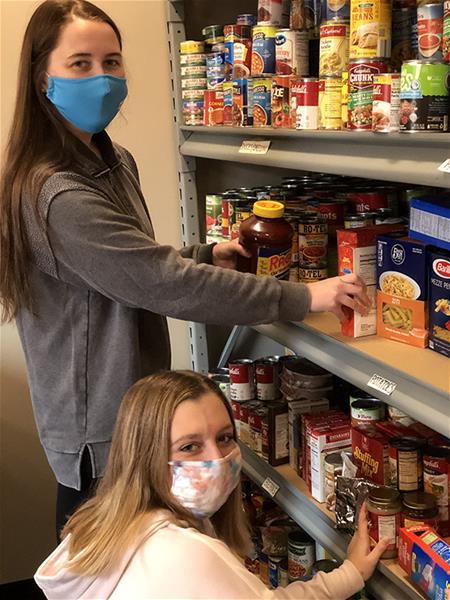 By Mike Hogan, '21
By Mike Hogan, '21
More than three summers ago, Alice Miller Nation could not have felt more surprised when she found out that students living and working on St. Bonaventure University's campus struggled to have enough food to get through a week due to a lack of money and other resources.
“They didn’t have the availability or access to food,” she said. “I was like, ‘wow.'"
So, Miller Nation drove home, filled up a bag with various food and brought it back to campus for the students.
She and others then began to do research and came across a frightening fact: far too many college students across the country are food insecure. According to data collected by College and University Food Bank Alliance, roughly 30 percent of college students are food insecure.
Miller Nation, who serves as director of Bona’s Franciscan Center for Social Concern, knew she couldn’t change everything. She did, however, know that she could make a positive impact on the Bonaventure community. Soon thereafter, she put together a task force to create a food pantry on campus.
Miller Nation’s vision quickly turned into a reality. Located in room 114 of the McGinley-Carney Center for Franciscan Ministry, St. Bonaventure’s food pantry officially launched in October 2019.
Miller Nation said trying to complete college courses without ample food can present great challenges to students.
“The term food insecurity is kind of a new term,” she said. “It’s basically when people don’t have enough. It’s when people don’t know where their next meal is going to come from. When you don’t have enough food, you can’t learn well. So, we set up a food pantry.”
Miller Nation said donations to the food pantry come in spurts.
Grace Seeley, a senior accounting and finance major from Big Flats, New York, who serves as one of the food pantry’s student coordinators, noted that at its beginning, the pantry only had non-perishable food items. But then things started to grow. It now offers fresh fruits and vegetables, frozen foods, and proteins.
To Miller Nation, one of the best highlights of the food pantry’s inaugural year was when Student Affairs conducted what she called “a rock star frozen food drive.” Simply put, it was a hit among those who use the food pantry.
“It was everything from frozen entrees to hamburger, meatballs and vegetables. One person brought in desserts and ice cream. Everybody needs some ice cream,” she said with a glowing smile and a laugh. “It’s people who really care and want to help out.”
Seeley hopes to see an even wider variety of options for students as the food pantry enters its second year of operation.
“As we grow, we are also trying to provide options to those who use the resource. Every time a patron comes in we have them complete a survey,” Seeley said. “We recently added a question [on the survey] to try to incorporate food options they are looking for, such as vegetarian or ethnic foods.”
While the food pantry’s initial purpose was for students, its doors are open to faculty, staff and other university employees as well. Miller Nation said each person who uses the food pantry can take five items per day.
“We guess that some of our staff members who get paid minimum wage use it,” she said. “If you have several kids, or if you’re putting money into gas, you might not always have money for food.”
In addition to the five item per day limit, Miller Nation said the food pantry often offers a variety of free items. Those items do not only include food, but personal hygiene products as well.
Miller Nation said one campus community member often donates select personal care items.
“She makes sure there is always shampoo, toothpaste, tooth brushes and feminine care products,” Miller Nation explained. “She is passionate about how much it costs to buy those items and wants to make sure students have what they need each day.”
Seeley, along with Olivia Lattimer, a junior criminology and Spanish major from Rochester, New York, help run the food pantry, which is open from 4-8 p.m. Monday through Thursday and 4-6 p.m. every Friday.
To help raise money and awareness for the Food Pantry, the FCSC will host #GivingTuesdayatBonas, a one-day fundraising event on December 1.
“It costs about $150,000 to run the many social justice, advocacy and service programs within the FCSC,” Miller Nation said. “Raising $40,000 on December 1 would help us close the gap in funding these crucial programs.”
She encouraged the community to visit www.sbu.edu/GivingTuesdayatBonas on December 1 to learn more and to make a donation.
“I am so proud we turned Alice's idea to combat food insecurity on our campus into a reality,” Seeley said. “This is important to me because not only is it helping our Bonaventure community now, it will continue to do so even after I graduate, and I am thankful to have been a part of that.”